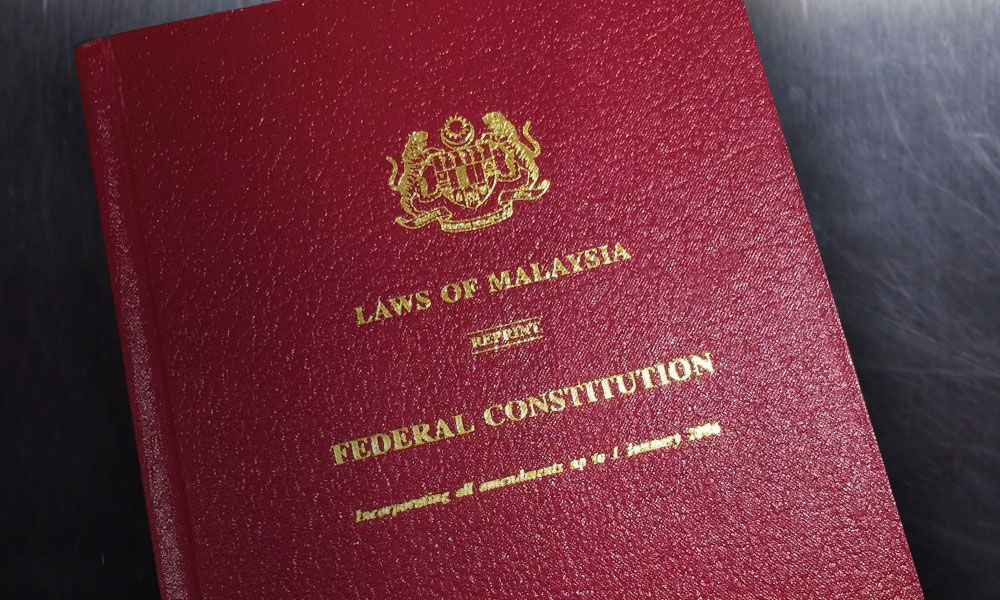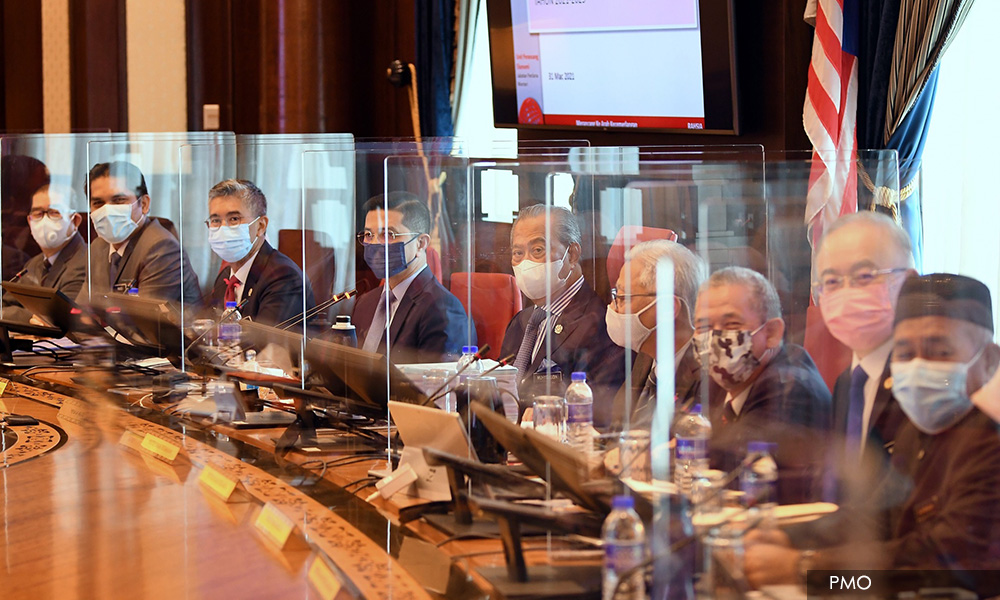After months of unnecessary political wrangling amid the raging pandemic, the prime minister, as the minister authorised by the cabinet, finally called for the Parliament to convene on July 26.
However, this immediately spooked the opposition MPs and some from the ruling coalition when the government issued a five-day schedule consisting of only briefings from ministers. Contrary to the issues decreed by the Yang di-Pertuan Agong, it seems the cabinet acted as the sole authority to decide on a Parliament agenda.
My contention is, as argued based on the Federal Constitution, only the Parliament can decide its agenda. In the case of the Dewan Rakyat, only the king and MPs have that exclusive authority.
By convention, the members of a meeting collectively decide on its agenda. That is why the first order of business is the adoption of agenda. The meeting cannot proceed until the agenda is adopted by consensus or a majority vote.
Nevertheless, there are so-called standing matters or compulsory issues that have to be addressed by the meeting. For example, in a body corporate, this is detailed in its constitution or memorandum of incorporation, such as the election of office-bearers, finance, operations, etc. Similarly, there are standing matters prescribed by the Federal Constitution, which takes precedence, and no one can delay or cop-out these items.
It is trite that our Federal Constitution upholds parliamentary democracy and rule of law. But this is conveniently side-stepped by partisan considerations.
The three pillars of democracy namely legislature, judiciary, and the executive (cabinet) act as check-and-balance, and none of these institutions can interfere, thwart, or influence the functions ascribed to the other pillars by the Constitution.
I highlight here a key constitutional provision rarely quoted, but which reaffirms unequivocally the principle above, and forms the basis of my opinion here. Article 43 (3) FC states “The cabinet shall be collectively responsible to Parliament”.
A simple, clear, and powerful statement. That means the cabinet cannot meddle with, other than facilitating, the affairs or business of Parliament, much less to decide what to discuss and when.
So what makes up the Parliament? Article 44 FC states “The legislative authority of the federation shall be vested in a Parliament, which shall consist of the Yang di-Pertuan Agong and two majlis (Houses of Parliament) to be known as the Dewan Negara (Senate) and the Dewan Rakyat (House of Representatives)”.
It follows then only the king and the MPs can decide on how the Dewan Rakyat's business should be conducted, which of course includes its agenda. For convenience, the MPs represented by the prime minister and the opposition leader should jointly decide on the agenda for the Parliament.
Strangely, the cabinet decides what should be on the agenda, and the opposition willingly waits for the agenda and then gripes over it after the fact. The speaker or the minister in charge of Parliament should be independent and only facilitate drafting the agenda as determined by the king/MPs.

Even then, there are standing matters under the Federal Constitution that should be on the agenda and which take precedence in terms of order and timeliness over all other matters. No one can meddle with them unless the Constitution itself is amended for this purpose.
Parliament standing matters
So what are these Parliament standing matters? Without the need to quote these obvious constitutional provisions, this would include the appointment of the speaker, bills, and finance (annual budget) which of course will be taken up in appropriate Parliament sittings. Could anyone imagine the cabinet delaying or refusing to table the budget at the end of the year?
However, in the current situation, where the country is under a Proclamation of Emergency, Article 150 (3) FC states “A Proclamation of Emergency and any ordinance promulgated under Clause (2B) shall be laid before both Houses of Parliament...”.
Therefore, this constitutional provision should become a standing order of business when the Parliament first meets, and is not subject to any argument or discretion.
Another urgent standing matter is Article 43 (2) (a) FC which states “the Yang di-Pertuan Agong shall first appoint as prime minister to preside over the cabinet a member of the House of Representatives who in his judgment is likely to command the confidence of the majority of the members of that House”.
The political posturing on both sides whether the prime minister has lost his majority is irrelevant and unnecessary. Article 43 (4) FC states “If the prime minister ceases to command the confidence of the majority of the members of the House of Representatives, then, unless at his request, the Yang di-Pertuan Agong dissolves Parliament, the prime minister shall tender the resignation of the cabinet”.
Therefore this becomes an urgent constitutional standing matter to be determined by Parliament. A confidence vote must be on the agenda to verify the constitutional legitimacy of the cabinet itself before any other Parliament business is conducted.
However, the cabinet has cleverly categorised these constitutional standing matters as “private matters” (motions moved by MPs), relegating it to the bottom of the agenda, never to see the light of the day. This is unconstitutional. If the Dewan Rakyat Standing Orders bestows any such powers on the cabinet, then it is ultra vires the Federal Constitution.
Furthermore, Article 150 (9) FC states “For the purpose of this article the Houses of Parliament shall be regarded as sitting only if the members of each House are respectively assembled together and carrying out the business of the House.”

Since the cabinet has agreed to convene Parliament, it cannot run away from discussing these constitutional standing matters. Please do not degrade the stature of the august House by labelling it as a special meeting, a briefing session; or that these standing matters will be taken up in subsequent meetings. Timeliness is extremely important.
Preserve, protect, and defend the Constitution
I was flabbergasted that the king’s decree was met with so much debate, resistance, and rebuke like never before, even from the government itself. I had to read the decree several times and check out the Federal Constitution, to see what was wrong.
It is beyond belief that the king, with the consultation of his fellow rulers, and painstakingly listening to all relevant parties, could have come up with a decree that is questionable. Indeed, as I have opined here, the king in all his wisdom has followed the Federal Constitution to the letter.
In brief, his message was to convene the Parliament as soon as possible to discuss the emergency ordinances and the Covid-19 National Recovery Plan which is wreaking havoc on the nation.
I am indeed sad that the king’s decree has turned into an acrimonious public debate. The cabinet itself, unfortunately, is questioning its own advice offered, through the presentation of the 2021 Emergency Ordinance for signature, on the powers of the king to convene Parliament as contained in the ordinance, but now quoting Article 40 (1) FC that the king has to act on advice.
The prime minister and MPs have sworn on oath to preserve, protect, and defend the Constitution. Why not just do that, especially when the rakyat is facing the worst crisis ever with no end in sight.
In conclusion, I confess I am not a trained lawyer. I am proud to say this, otherwise, my opinion may differ based on clients. I have diligently focused on the provisions of the Federal Constitution, nothing else.
But I must add that, in my professional career, I have drafted national bills, regional (Asean) agreements, and negotiated several international (UN) agreements/conventions. It was mostly in the difficult sphere of environmental law covering many subjects.
In Asean, I had to draft the regional agreements, and help negotiate and finalise them. I faced intense legal inquiry from legal representatives of the 10 countries.
They disagree based on national interest, but I had to offer legal solutions. What saw me through was the trust they had in me, as neutral and impartial. It is in this context that I offer this opinion.
The law is not an ass, only the practitioners turn it into a donkey. No insult meant to animals. - Mkini
RAMAN LETCHUMANAN was director, Environment/Conservation, Ministry of Science, Technology and the Environment (1993-2000), head of Environment/ Haze/Disaster Management, Asean Secretariat, Jakarta (2000-2014), and senior fellow at S Rajaratnam School of International Studies (RSIS), Nanyang Technological University, Singapore (2014-2016). Email: raman.asean@gmail.com.
The views expressed here are those of the author/contributor and do not necessarily represent the views of MMKtT.




No comments:
Post a Comment
Note: Only a member of this blog may post a comment.